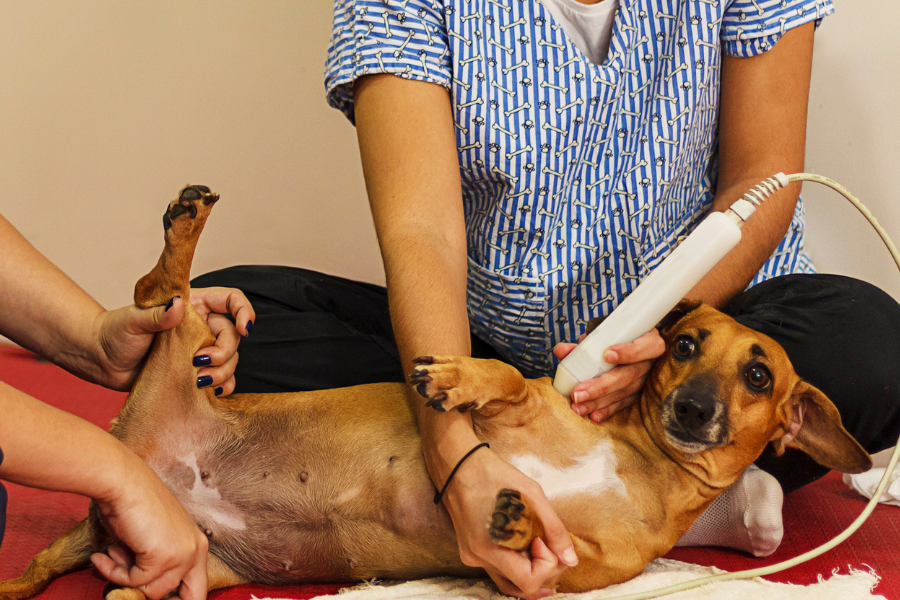Ever seen your little furball getting all jittery, barking non-stop, or freaking out during thunderstorms? Just like you and me, our doggy pals get stressed out and anxious—maybe from being alone at home, those dreaded vet visits or that monstrous vacuum cleaner (it's clearly a beast in disguise, right?). Here's where the good news comes in – there's this natural solution that's got dog owners and vets everywhere buzzing. Give a big hello to L-theanine, a chill-out compound that could soon be your dog's next (or should we say second?) best bud.
If L-theanine for dogs is a new thing for you, no sweat, dude. That's why we've got this blog here. By the time you reach the end of this article, you'll be clued in on what it is, how it does its magic, and why so many dog parents are starting to lean on it to help their canine buddies lower their stress levels.
What is L-Theanine, Anyway?
Here’s the sneaky genius of it all—L-theanine isn’t even designed for dogs. Originally, this naturally occurring amino acid found in tea leaves (green tea, especially) was popular among humans for staying calm, focused, and stress-free. But it turns out, our furry companions can benefit just as much as we do.
Unlike synthetic sedatives, which can knock your dog out or leave them groggy, L-theanine gets to the root of anxiety—helping to calm your dog without turning them into a sleepy couch potato. It plays around with the brain’s chemistry, balancing mood-regulating neurotransmitters like dopamine and serotonin to reduce stressful vibes.
Cool, right? But before rushing off to buy some, hold tight—there’s a lot more to unpack.
Signs Your Dog May Need a Little Extra Calm
Not sure if your dog could use a little L-theanine TLC? Here are a few telltale signs of stress or anxiety in dogs:
- Excessive Barking: When your pupper barks nonstop, especially when left alone.
- Destructive Behavior: Chewed-up shoes, furniture, or even... walls?! Yep, anxiety can lead to destruction.
- Pacing or Shaking: Some dogs can’t sit still when they’re stressed—or they shake like a leaf during events like fireworks.
- Loss of Appetite or sudden potty accidents where they normally wouldn’t go.
- Aggression or Overreaction to small things like doorbells or unfamiliar visitors.
Sound familiar? Then L-theanine might just be the natural, effective solution you’ve been searching for.
The Benefits of L-Theanine for Dogs
Here’s where things get exciting. L-theanine has a bunch of benefits for dogs, ranging from stress management to improving focus. Below are the key benefits that dog owners, behaviorists, and even veterinarians are raving about.
1. Helps Reduce Anxiety
Anxiety in dogs is no small matter—it can affect their overall quality of life. Whether it’s separation anxiety, travel anxiety, or a fear of loud noises, L-theanine promotes calmness without sedation. Unlike some over-the-counter meds, your dog doesn’t lose their personality or energy. They’re just... more relaxed.
2. Promotes Better Behavior
With a calmer mindset comes better behavior. If anxiety is causing your pup to act out (like barking nonstop or wrecking your couch), L-theanine supports a more balanced demeanor. That means fewer barking sprees, and a lot less destroyed furniture.
3. Boosts Focus and Training
Training a hyper, distracted dog can feel impossible. But the calming properties of L-theanine often boost focus, meaning your dog is less likely to act on impulse and more inclined to listen to commands. Basically, it’s like giving your dog invisible noise-cancelling headphones during training sessions.
4. Non-Sedative, Natural Calm
Forget the days of sedatives that make your pet seem drowsy or disoriented. L-theanine works its magic while keeping your dog alert, playful, and energetic—but in a calm, manageable way.
5. Supports Long-Term Mental Health
Dogs with frequent stress and anxiety can develop long-term issues, including depression-like symptoms. L-theanine can help stave off these mental health challenges, acting as an everyday mood stabilizer for particularly anxious pups.
How Can Dogs Take L-Theanine?
"Okay, I’m sold. How does my dog actually take L-theanine?” Great question. Typically, L-theanine is available as chewable tablets or powder that you can sprinkle onto food. Many dog-friendly products combine L-theanine with other calming ingredients like chamomile or melatonin for added benefits.
Dosing Tips
Dosage depends on your dog’s size, weight, and specific needs. For example, a small dog might require 50 milligrams per day, while a larger dog may need around 200 milligrams. Always follow product directions and consult your veterinarian before starting any supplement. (Yes, even natural ones!)
Are There Any Side Effects?
One of the reasons dog owners love L-theanine is that it’s generally well-tolerated by dogs. However, as with any supplement, side effects are possible—but rare. These could include mild drowsiness or gastrointestinal upset if given on an empty stomach. Starting with a smaller dose can help prevent any tummy troubles.
And remember, while L-theanine is an amazing tool for anxiety and stress reduction, it’s not a cure-all. If your dog has severe behavioral issues tied to anxiety, working with a professional dog trainer or animal behaviorist can unlock even better results in tandem.
Pairing L-Theanine with Training and Lifestyle Changes
Dog parents are totally smitten with L-theanine, and who can blame them? This stuff is usually A-OK in our furry friend's books. Of course, like any good thing, there might be a few minor hitches. We're talking about a potential nap or two, or perhaps a little upset tummy if you forget to give it with a snack. Starting small can help dodge any digestive drama.
But hold up, this isn't a magic potion folks! While L-theanine is pretty awesome at keeping those jitters at bay, it doesn't work miracles. If your pooch has bigger worries than the postman, you might want to team up with a professional. A dog trainer or animal behaviorist can be just what your pup needs.
On to the good stuff, mixing L-Theanine with a few lifestyle changes could be your golden ticket. Remember:
- Zen Zone: Make sure your pup's got a chilled-out spot they can escape to when the world gets a bit too much.
- Workout Time: Nothing soothes a worried pup like a good romp around the park. Regular exercise helps burn off that excess energy and reduce the old nerves.
- Gold Stars: Who doesn't love a treat? Use praise, cuddles, and snacks to reward calm behavior.
- Get Used to it: Slowly introduce your pup to their fears, while making it a positive experience. Over time, they'll chill out.
While L-theanine is one great tool, the combo of all these things is where the magic really happens, folks!
Is L-Theanine Right for My Dog?
Every pooch is a one-of-a-kind masterpiece, no doubt about it. L-Theanine has been a total game changer for fretful furballs, big and small. But remember, it's all about what’s best for your little buddy. So, don't forget to play it safe - hit up your vet and have a little chit-chat about any health stuff that might make it a no-no.
For those jittery pups who just can't seem to chill or get in the zone, L-Theanine has repeatedly stood up as a cool, effective answer. It's basically Mother Nature whispering, "Chillax buddy, everything's cool. Breathe in, breathe out."
Final Bark (Get it?)
Your dog deserves peace of mind, just like you do. Whether it’s thundering skies, crowded parks, or unexpected mailmen, L-theanine may just be the key to calming your furry friend’s nerves and helping them live their happiest, waggiest life.
If you’re looking for high-quality L-theanine dog supplements—or if you have questions about how to integrate them into your dog’s routine—drop us a message. Happy dogs. Happy life.
Your best bud will thank you, one tail wag at a time.
Frequently Asked Questions (FAQs)
Q: Is L-theanine safe for all dogs?
A: Pretty much, yes! L-theanine is generally safe for most dogs, but it’s always a good idea to check with your vet first. Every dog is different, and factors like size, age, and health conditions can come into play.
Q: How long does it take for L-theanine to start working?
A: Most dogs will feel the chill vibes within 30-60 minutes after taking L-theanine. For longer-term benefits, regular use might be the way to go. Patience, my friend—good things take time.
Q: Can I use L-theanine daily, or is it just for occasional stress?
A: Both! If your dog deals with ongoing anxiety, daily use can help keep things mellow. For situational stresses, like fireworks or vet visits, it’s perfect as a one-time helper too.
Q: Are there any side effects I should watch for?
A: Side effects are rare, but some dogs might experience mild tummy upset or drowsiness. Keep an eye on your pup and adjust the dose if needed.
References
1) Pike, A. L., Horwitz, D. F., & Lobprise, H. (2015). An open-label prospective study of the use of L-theanine (Anxitane) in storm-sensitive client-owned dogs. Journal of Veterinary Behavior, 10(4), 324-331. https://doi.org/10.1016/j.jveb.2015.04.001



